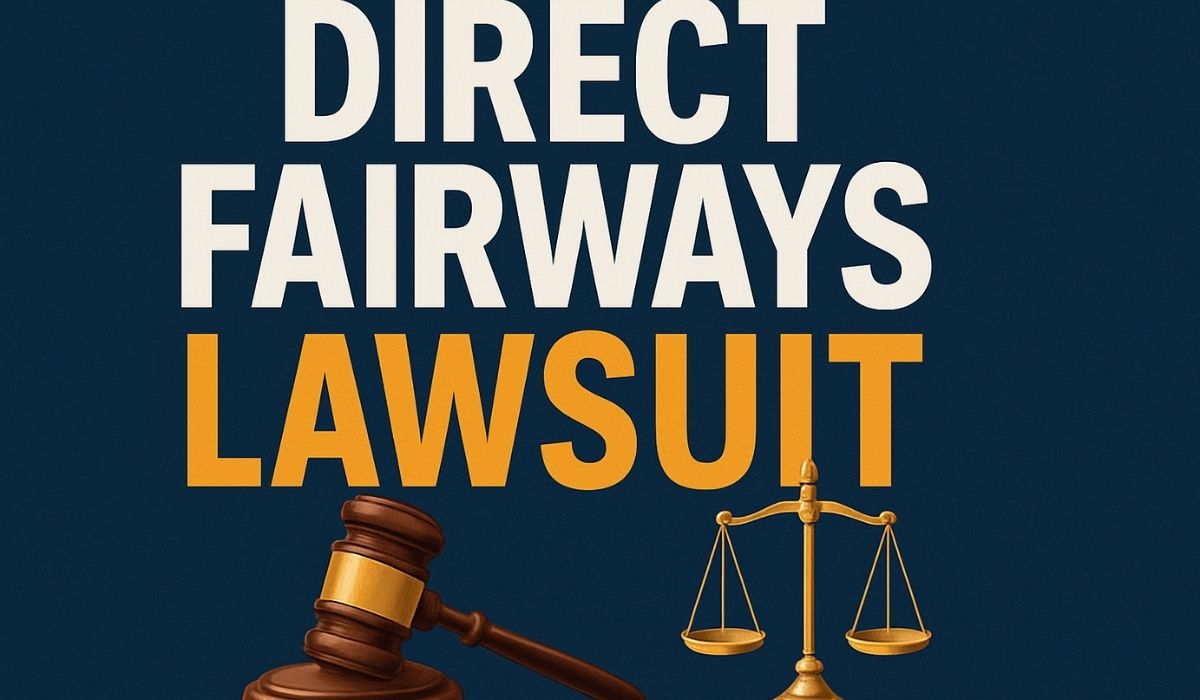The sports marketing industry is filled with innovative companies that merge traditional business models with the unique atmosphere of athletic culture. One such company, Direct Fairways, emerged as a notable player in the golf marketing world, establishing itself through customized promotional products for golf courses. But while the company was initially praised for its business strategy, recent years have seen its reputation tarnished by a highly publicized legal battle. The Direct Fairways lawsuit has not only thrown the company’s practices into question but has also sparked broader discussions about ethics in niche marketing industries. This in-depth exploration will uncover the origins of the lawsuit, the allegations involved, the potential fallout, and what it means for businesses.
What is Direct Fairways?
Direct Fairways is a marketing firm that carved its place in the golf industry by producing promotional materials like yardage books, scorecards, course guides, and other custom products tailored for golf courses. Based in Arizona, the company’s pitch was simple yet appealing: create advertising opportunities for local businesses while providing value-added materials to golf clubs and players. By connecting small businesses with affluent golf communities, Direct Fairways promised exposure that was both targeted and exclusive.
Their strategy worked well in the beginning, as many golf courses and local businesses saw potential in mutually beneficial advertising arrangements. Companies advertised within golf guides, expecting high visibility in a leisure setting where players spend several hours per visit. Golf courses, in return, received free or subsidized materials that enhanced their operations. It seemed like a win-win for all parties involved—until things began to unravel.
The Rise of Complaints and Red Flags
Despite the seemingly straightforward business model, trouble started brewing when numerous former clients and employees began voicing concerns about Direct Fairways’ practices. Reports surfaced about high-pressure sales tactics, misrepresentations, and even instances where services paid for were allegedly never delivered. For example, some advertisers claimed that they never saw their ads printed, while others noted that the circulation numbers promised by sales representatives were grossly exaggerated.
Former employees painted a troubling picture of the company’s internal culture. Several whistleblowers alleged that they were trained to mislead potential clients by overstating the exposure and reach of Direct Fairways’ products. Sales targets were aggressive, and employees who failed to meet them often faced intense scrutiny or dismissal. This high-pressure environment allegedly led many salespeople to cross ethical boundaries just to close deals, laying the groundwork for what would eventually escalate into legal action.
The Core Allegations in the Direct Fairways Lawsuit
The Direct Fairways lawsuit revolves around multiple serious allegations, the most prominent of which include fraud, deceptive trade practices, breach of contract, and false advertising. Plaintiffs in the case argue that Direct Fairways misrepresented its advertising reach and effectiveness, luring businesses into contracts with promises that were impossible to fulfill.
Fraud is a particularly heavy charge, as it suggests not just poor service or operational errors but an intentional strategy to deceive clients. This aspect of the lawsuit could have severe legal implications if proven true. Additionally, the complaint includes accusations of unfair and unethical treatment of employees, citing an internal culture that rewarded manipulation over honesty.
Other legal claims in the suit involve breach of contract, where clients paid for marketing materials that were either not produced, not distributed as promised, or printed in substandard quality. This created financial losses for small businesses that had invested their marketing budgets in Direct Fairways’ offerings, expecting tangible returns that never materialized.
Impact on Small Businesses and Golf Communities
One of the most disheartening aspects of the Direct Fairways lawsuit is its impact on small businesses that trusted the company to boost their local visibility. Many of these businesses operated on limited marketing budgets, and an investment in a golf guide ad represented a significant expenditure. When their expectations went unmet, it wasn’t just a loss of potential customers—it was often a direct financial hit that some could scarcely afford.
Moreover, golf courses themselves experienced reputational damage by association. Some clubs found themselves fielding complaints from advertisers who had partnered with Direct Fairways under the assumption that the golf course endorsed the company’s legitimacy. This put several golf course managers in uncomfortable positions, straining relationships with local businesses that are essential to their community engagement strategies.
Legal and Financial Ramifications for Direct Fairways
As the lawsuit gained public attention, the financial stability of Direct Fairways began to waver. Legal battles are not only costly but also damaging to a company’s public image and client trust. Pending litigation can stall business growth, deter potential partners, and even scare away current clients fearing association with controversy.
In the event that the court rules against Direct Fairways, the company could face substantial financial penalties, including compensation payouts to affected clients and former employees. Additionally, regulatory bodies might impose further sanctions if any illegal activities—such as fraud or deceptive practices—are conclusively proven.
There is also the looming threat of class-action status if more plaintiffs come forward, which could exponentially increase the company’s legal liabilities. If the lawsuit results in a class-action suit, Direct Fairways might find itself facing insolvency or forced restructuring, as was the case with other companies caught in similar scandals.
Broader Implications for the Marketing Industry
The Direct Fairways lawsuit also serves as a cautionary tale for the wider marketing industry, especially niche sectors like sports marketing. It underscores the importance of transparency, ethical sales practices, and robust operational standards. In industries where advertising metrics can be nebulous and hard to verify—such as local print distribution—companies must establish clear, honest communication with their clients.
Furthermore, the case highlights the potential pitfalls of overly aggressive sales cultures that prioritize revenue over client satisfaction. Sales-driven organizations need to balance ambition with ethics, ensuring that their representatives are adequately trained to inform rather than manipulate prospective clients.
Can Direct Fairways Rebuild Its Reputation?
Reputation management in the wake of a scandal is an arduous process, and for Direct Fairways, the path to redemption will be steep. First, the company would need to address the allegations transparently, perhaps through an independent audit of its practices and public disclosure of the findings. Instituting ethical training programs for employees and revising sales scripts to ensure honesty can also go a long way in repairing credibility.
Moreover, Direct Fairways might benefit from engaging directly with affected clients, offering reparations or refunds where due. Taking responsibility, rather than deflecting blame, can be an effective step in restoring stakeholder trust. Without these measures, however, it is unlikely the company will regain its standing in the competitive world of marketing.
The Consumer’s Perspective: What to Watch Out For
For small businesses considering partnerships with niche marketing firms, the Direct Fairways lawsuit offers important lessons. Always perform due diligence before signing contracts—ask for verifiable metrics, speak with past clients, and understand cancellation or refund policies. Avoid firms that use high-pressure sales tactics or refuse to provide written guarantees of service quality and delivery timelines.
Additionally, businesses should be wary of vague promises about audience reach or potential exposure. In an age where digital marketing offers trackable results, any company providing traditional advertising should still be able to present transparent distribution data and client testimonials.
Conclusion
The Direct Fairways lawsuit is more than just a legal conflict; it is a window into the challenges and risks associated with specialized marketing sectors. As the case unfolds, it may set important precedents for how marketing companies can and should conduct business. Whether Direct Fairways can survive this storm remains to be seen, but the lessons for businesses, marketers, and consumers are already clear: ethics, transparency, and accountability must be at the heart of any marketing operation.
Only time will tell if Direct Fairways can recover from this significant blow to its reputation, but the fallout has already reshaped conversations around marketing ethics and business accountability. For now, the industry watches closely, knowing that this lawsuit could redefine the boundaries of acceptable practice in marketing, especially in specialized arenas like the world of golf.
Frequently Asked Questions (FAQ)
1. What is the Direct Fairways lawsuit about?
- The Direct Fairways lawsuit involves allegations of fraud, deceptive trade practices, breach of contract, and unethical sales tactics. Clients and former employees claim the company misrepresented its services and advertising reach, leading to legal action.
2. Who filed the lawsuit against Direct Fairways?
- The lawsuit includes complaints from former clients, small businesses, and former employees who allege they were misled or treated unethically by the company.
3. What impact does the lawsuit have on small businesses?
- Many small businesses that invested in Direct Fairways’ advertising services claim they lost money due to undelivered services or ineffective advertising, causing financial strain.
4. Can Direct Fairways recover from this lawsuit?
- Recovery is possible but will require substantial efforts in transparency, ethical reforms, client reparations, and possibly legal settlements to regain trust and credibility.
5. What lessons can other businesses learn from the Direct Fairways lawsuit?
- The lawsuit underscores the importance of ethical sales practices, transparency in marketing metrics, and the need for companies to maintain accountability to both clients and employees.









